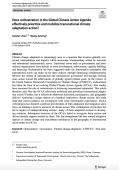This report identifies a mix of 21 policy levers with which it would be possible to achieve Mexico’s conditional nationally determined contribution (NDC) at an average cost of US$12 per ton.

This article explores whether the Global Climate Action Agenda (GCAA) effectively mobilises and prioritises transnational adaptation action.
The report proposes a framework to understand intertwined objectives of empowering people, ensuring inclusiveness and equality as fundamental features towards realising the 2030 Sustainable Development Agenda.
This report examines the transition risks to the economy of South Africa—and its government, municipalities, companies, and financial institutions—from a global economic transition to a low-carbon economy. The analysis in the report not only quantifies the downside risk of South Africa’s transition, but it also forecasts some of the potential benefits of a transition such as the impact of a lower global oil price that is passed through to consumers.
This paper evaluates the level of integration of climate mitigation and adaptation in cities’ local climate action plans and explores the different types of mitigation—adaptation interrelationships. It comprehensively evaluates nine adaptation and mitigation plans and presents a framework, which identifies the following sectors as avenues for synergy (or co-benefits): urban greening, urban agriculture, and water management.
